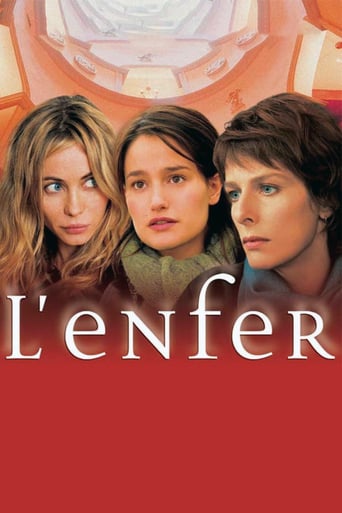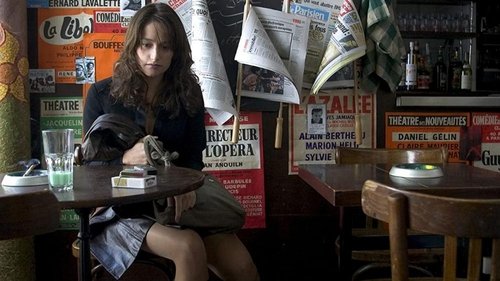johnnyboyz
After the film about the trapped soldiers comes the film about the collection of women trapped in marital situations, love affairs and general relationships with other men; two pieces depicting routine scenarios wherein one cannot merely 'up' and walk away in spite of the simplicity of the set up. The troops in director Denis Tanovic's "No Man's Land" were of course bound by a terrifying situation involving an anti-personnel mine and their inability to merely leave it alone whilst existing perched on the frontline of a war anyway - the women in his 2005 French language drama "Hell" is a detailing of a less than terrifying proposition on paper, although one that is just as equally engrossing, as a group of people this time move freely about their surroundings whilst dealing with an array of altercations born out of time spent with the male gender.The film follows three sisters and their tremulous paths in life born out of the presence of men. One sister of whom appears frightened of instigating a relationship; one of whom is stuck in one that is falling apart and the other of whom desires greatly to start one with somebody who's not necessarily interested. The women, respectively, are Céline (Viard); Sophie (Béart) and Anne (Gillian), three siblings occupying a Paris playing host to love-'n'-all-that, only not in the way someone unfamiliar to the city nor film making as a whole would portray such a thing in such a place. There is romance in the film, but nothing necessarily romantic about the piece, nor what people go through as a congealed whole – there are affairs and there is love, but it is tremulous and often unpleasant for those sharing in it.Céline is a nice, polite young woman; a woman whose trauma during infanthood saw both her and her mother encounter their father/husband at his workplace at precisely the wrong time when entering into his office to catch him in the presence of a naked male infant. You might say the event has appeared to have gone on and moulded where Céline stands in terms of the opposite gender - a patient, albeit often scatty woman, she spends time with her wheelchair bound mother reciting some of the more morbid world records contained within a particular book sponsored by a particular alcoholic beverage. Céline has an admirer, a man from the past who's apparent in her life out of one, big misunderstanding from the offset. Céline is wary, since the events surrounding how she knows him are traumatic enough to leave an imprint without necessarily being enough to send her totally mad. Sexuality and sexual connotations are embroiled in the connection - when she removes her clothes for him on account of entrusting him to be reading from the same page as she is in terms of mutual attraction, history repeats itself in the most unfortunate, although rather blackly amusing, way possible. In spite of what precedes it, the gentleman is decent: someone whose sensitivity is apparent out of the fact the film establishes him to enjoy poetry and of whom seems to walk around with an analogue watch which can 'beep'.Emmanuelle Béart's character wakes up in the morning, but not beside her husband – he's already up and too busy out in the hallway taking on the phone to another young woman, someone whose picture dons the walls of his photographic studio where he works. Desire and sexuality have often followed Béart around in the roles that she's previously undertaken, with the likes of Manon des Sources; Histoire de Marie et Julien and Nathalie... coming to mind as films depicting the actress central to relationships that range from unrequited to just plain odd and very much feature another man. Here, we have fun watching her as someone who's obviously become somewhat unappealing to a man. Where Sophie is the victim in one strand driven by an extra marital affair, Anne is busy instigating one of her own with an older man – a lecturing professor whose car of choice is an old DS19 in a story about befriending an elder suitor that runs parallel with her younger sister Célines' courting of a younger man.If the film strikes us, then it's down to its maturity in dealing with what it depicts. The film is about women and about women and their interactions with the gentlemen they encounter that carry romantic intentions, but there is no desire to depict neither them nor the events in their life as off the wall or 'wacky'. There is an innocence to proceedings, something undercut by what is probably the most interesting of the three tales in Béart's strand – a story depicting fall out; suspicion and great anger. These are women we sense might actually exist and women whose actions have the sorts of consequences which impact upon them enough for us to sense they feel it – a lesser film may have had them pick themselves up; dust themselves down and move onto the next unrealistic, socially clumsily romantic set piece for our meager amusement. Tanovic weaves in a narrative about family feuding; memory and repent with Céline's chapter, something which actually works as a decent bookender enabling these stories to congregate together where previously there was distrust and alienation. If his aforementioned 2001 effort No Man's Land wove into the central content this exasperated story of these French U.N. soldiers plodding their way to the soldiers in need of assistance, then this burning background narrative involving a misplaced child and the core character's father from decades ago fills in for the blue helmeted squad of international support chugging across the barren landscape of war torn Yugoslavia. Whatever you take away from it, and there is content here to get excited about, the film as a congealed piece is strong and creditable.
mamlukman
I saw this at the Toronto Film Festival when it first came out in 2005. The director was there to answer questions, as was the lovely Marie Gillain. She is absolutely awesome in person! The NTSC DVD was released in late 2009.I think this is one of those movies where it depends on what the viewer brings to the theatre. I can see where it could leave some people cold, but to me it was extremely relevant and moving. The basic plot is how the father's actions affect his wife and children. But really it is about how the wife's actions affect the father and the children. Because ultimately it is not the action (or supposed action) itself that causes the issues, it's the reaction of the wife that causes the later reaction in the children. It's really a lesson in giving someone the benefit of the doubt, of loving them enough to trust them. The details of what the children do to screw up their lives is necessary, but only to show that they are screwed up. The details are unimportant, and those who focus on this aspect of the movie--although it obviously takes up a lot of time--are missing the point. I suppose you could try to psychoanalyze each daughter and her issues--is the one who's having an affair with a professor looking for a substitute father? etc.--but I think that is unnecessary. The real climax is the last line of the movie, as others have said. It really gives you something to think about and it puts the rest of the movie into context. It's downright chilling.The opening scene of the cuckoo and the nest was, according to the director, an accident. They were filming the father's release from prison, and they ran across this nest with the cuckoo, so they filmed it because it was so cool. So cool that they stuck it in as the opening scene. I know I spent the entire movie trying to figure out the analogy between the cuckoo and the rest of the movie...I suppose there's a vague connection, but don't lose sleep over it. Watch it as a segment in a nice nature movie, and then concentrate on the movie itself.
Claudio Carvalho
In Paris, a family is victim of a tragic incident, when the patriarch is denounced by his wife of pedophilia. Years later, the three sisters have independent dysfunctional lives and never see each other. The middle sister Sophie (Emmanuelle Béart) finds that her beloved husband and photographer Pierre (Jacques Gamblin) is unfaithful and is having an affair with Julie (Maryam d'Abo) and he leaves her. When the lover discovers that Pierre has two children, she ends the affair. The youngest, Anne (Marie Gillain), is student of Sorbonne and has a crush and gets pregnant of her professor Frédéric (Jacques Perrin), who is married and father of her best friend. The oldest sister, Céline (Karin Viard), is a lonely woman that periodically travels by train to visit her handicapped dumb mother Marie (Carole Bouquet) that is trapped in a wheelchair in an asylum for elders. When the stranger Sébastien (Guillaume Canet) contacts Céline, she believes he is a shy admirer; however, after an awkward encounter, he reveals secrets from the past that will affect the relationship among the sisters."L' Enfer" is a heavy drama of sisters in love, actually doomed love, and is an analogy to the Medea Greek tragedy: Sophie loves her unfaithful husband; Anne loves her professor and father's figure; Céline is needy of love. In common, the three sisters have their lives affected in their childhood by a tragedy caused by the attitude of their mother that accused her husband of pedophilia, never listening to his explanations and giving the chance of defense. The trio of lead actresses are great actresses and extremely beautiful, and the gorgeous Carole Bouquet is unrecognizable in the role of an old and suffered woman living her personal hell. My vote is seven.Title (Brazil): "Inferno" ("Hell")
kodpropalogfudbalera
Just saw Tanovic's "L'Enfer" last night at Sarajevo Film Festival. Being a Bosnian himself and being the only Director from this region who has ever won an Oscar (which is a source of envy on the part of many film-makers, critics and others in the industry who use every opportunity to blemish him and his work in sensationalism-prone media), he received a seating (unfortunately, not standing) ovation from the crowd. In my view, he deserves a standing ovation for his rendering of the script of a legendary Polish film-maker, Kiezslowski.This is Tanovic's second movie after an awe-inspiring Oscar-winning debut (for those of you who do not hold Oscar in high esteem, he won a dozen awards from film academies and organizations all over the place). One might say that "L'Enfer" is a perfectly French movie with its setting, acting and pace, just as No Man's Land perfectly captured the essence of Bosnian predicament at the time. I was impressed by Tanovic's ability to make his movies very much recognizable, and yet retaining that note of universality that is very much needed for full appreciation by the international audience.Nothing in this movie seems redundant or out of place to me, and everything from the opening scene, which is bordering on spectacular, down to the last words of Carol Bouqet with which the movie ends is in service of good film-making. Overall, Tanovic's "L'Enfer" is a worthwhile cinematic experience, a modern tragedy well-captured by a director with an eye for a detail, and finally an exciting second movie that will be, I'm sure, appreciated by movie-goers around the globe. An intelligent, likable, and well-executed piece! I could not wish for more.




